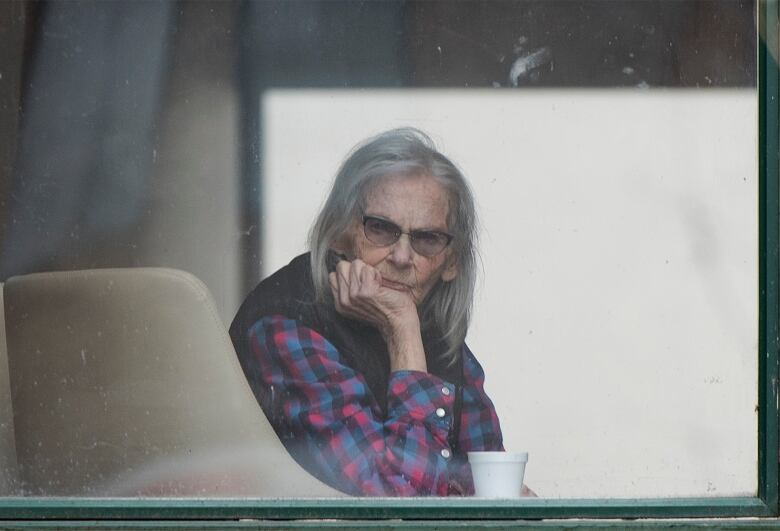Montreal police, coroner investigating owner of seniors' residence where 31 died in less than 1 month
Public health agency has taken charge of CHSLD Herron

Montreal police have launched a criminal investigation into the owner of a private long-term care home in Dorval, a suburb in the city's West Island. Thirty-one residents at the facility have died in less than one month.
It will take weeks or months before the investigation is complete, police say. Investigators were at the residence overnight, leaving Sunday morning and returning again Sunday afternoon.
"There's a lot at stake when there are families that have lost their loved ones, that are concerned about what happened to them, so we really have to take the time," said Insp. André Durocher, a spokesperson for the Montreal police (SPVM).
He said investigators from the SPVM's major crimes unit will collect various types of evidence: security camera footage, administrative documents and lists of personnel and residents. Then they will talk to family members, staff and residents to determine what happened and whether there will be criminal charges.
Quebec's coroner's office has also opened an investigation into the 31 deaths. It will determine the causes and circumstances of the deaths, and provide recommendations on how to prevent these types of deaths in the future.
The regional public health agency, known by its French acronym CIUSSS, has taken control of CHSLD Herron. Public health officials are now inspecting all private long-term care homes to ensure they are dealing with the COVID-19 outbreak properly.
The Health Ministry said that when they arrived at the end of March, most staff had already abandoned the facility where about 150 seniors live, and that conditions were dire. It took a court order, issued Wednesday, to get the residents' medical files.
The government says at least five of the deaths were linked to the novel coronavirus.
"I think it looks a lot like major negligence," Premier François Legault said Saturday.
The facility is owned by Katasa Group, a company based in Gatineau, Que., owned by Samir Chowieri and his three daughters. The company runs seven elder-care facilities in the province.
In a statement, the company said its employees have made "extraordinary efforts" since the COVID-19 crisis began and their calls for help were ignored by the West Island CIUSSS.
"We hope that the attention aroused by our situation will lift the veil on the lack of support from the West Island CIUSSS for the teams working in CHSLDs," the statement said.
An official with the company, who declined to speak on the record, contested the government's version of events. The official also said public health directives requiring people to self-isolate had left the facility understaffed in the early days of the outbreak.

'The older people are neglected'
Darrel Whitehead's father died Saturday at CHSLD Herron. He'd been living at the facility for three years.
For the last two weeks, Whitehead said his father was malnourished, was not given water and was left to live in filth.
They found out last weekend that he had tested positive for COVID-19, but for a week after that, they could not get through to the residence.
Whitehead received a voicemail early Saturday morning. When he called back, he was informed that his father had died.
"The older people are neglected. They should have had priority," he told Radio-Canada. He said his father had Parkinson's disease and could not communicate verbally.

On Sunday afternoon, Lynne McVey, head of the public health agency for the western region of Montreal, said that things are improving at the residence now that it is under its management.
"We are really seeing the situation stabilize," she said. Four doctors and a team of nurses are working there, she said, and an agency employee is at the reception desk, contacting the families of those living there.
'I saw a man dead in his bed'
Even so, one social worker who volunteered at CHSLD Herron said she saw some difficult things at the residence Sunday morning.
Mandy Leonard said staffing is sparse, with only one orderly for two floors, one cleaning team and a few nurses.
"I saw a man dead in his bed. I wasn't expecting that," Leonard said. "I went to bring him his breakfast and he was dead. And it was obvious it had been a while since he died."
She said workers and residents told her things have improved a lot in the past two days.
"The people who were brought in to help are doing a great job," Leonard said. The odours of feces and of death have gone away, she said. "But we've only just established a base."
Leonard said the hardest thing was seeing isolated and confused seniors who didn't understand why they were being quarantined.
"I worked in a crisis centre for 17 years and I've seen a lot, but I've never seen anything like what I saw this morning."
With files from Radio-Canada, Claire Loewen, Jaela Bernstien and Kate McKenna
